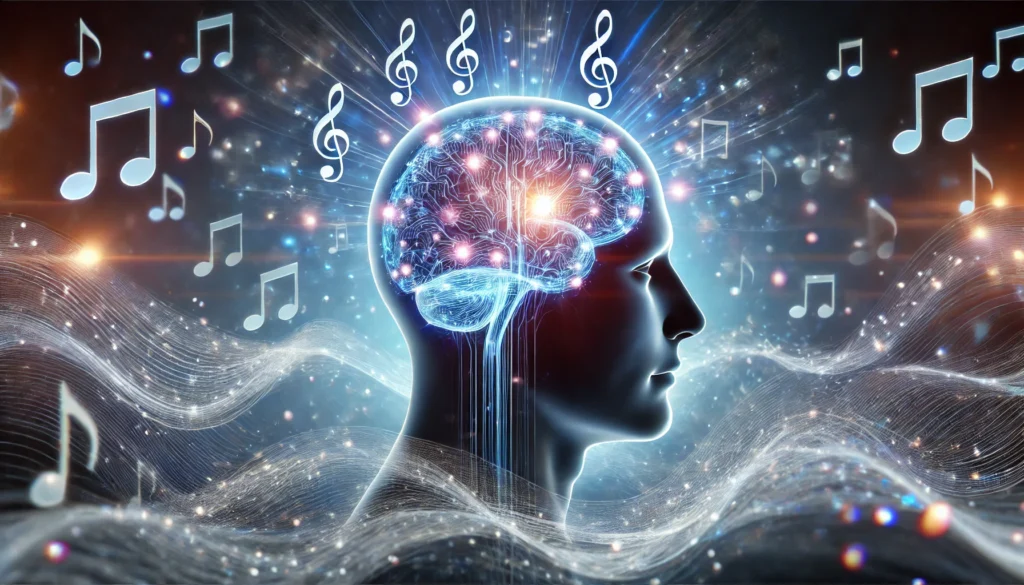In today’s fast-paced world, the ability to concentrate and maintain productivity is more important than ever. With numerous distractions vying for our attention, finding methods to enhance focus has become a priority for many. One effective yet often overlooked strategy is the use of music. This article delves into the science behind music’s impact on concentration and productivity, offering insights for health and wellness coaches, science journalists, and biohackers.
You may also like Top 10 Tracks for Enhanced Focus
The Historical Context of Music and Focus
Music has been intertwined with human history for millennia, serving purposes that range from ritualistic to recreational. Ancient cultures recognized the power of music to influence mood and behavior. The Greeks, for instance, employed music as a therapeutic tool, believing it could heal the body and mind. As our understanding of the brain evolved, so did our insight into how music could be harnessed to improve cognitive functions, including concentration.
Ancient Beliefs and Practices
In ancient societies, music was more than entertainment; it was a pivotal part of spiritual and healing practices. The Egyptians used chants and rhythms in their healing rituals, believing that music could ward off evil spirits and restore balance. Similarly, Chinese medicine integrated music therapy to harmonize the body’s energy, reflecting an early understanding of music’s calming effects.
Music as a Healing Tool
Throughout history, music has been considered a healing agent. Native American tribes used rhythmic drumming as part of their healing ceremonies, intending to connect individuals with the spiritual world. This therapeutic use of music laid the groundwork for modern music therapy, highlighting its potential to influence mental and physical health positively.
The Evolution of Musical Therapy
As societies evolved, so did the application of music in therapeutic settings. By the Renaissance, music had become a recognized tool for managing emotions and enhancing mental clarity. This period saw the formalization of music therapy as a discipline, leading to the contemporary understanding of music as a facilitator of mental focus and emotional well-being.
Scientific Underpinnings: How Music Affects the Brain
Music and the Brain’s Reward System
At the core of music’s ability to enhance concentration lies its interaction with the brain’s reward system. Listening to music triggers the release of dopamine, a neurotransmitter associated with pleasure and motivation. This biochemical response can make tasks seem more enjoyable, thereby increasing focus and productivity. The right music can thus serve as a powerful motivational tool, transforming mundane tasks into engaging activities.
Dopamine and Task Engagement
When music stimulates dopamine release, it effectively turns tedious activities into more engaging ones. This heightened engagement can lead to improved task completion rates and a more positive outlook on work. By making tasks more enjoyable, music can reduce procrastination and encourage a more proactive approach to challenging assignments.
Emotional Regulation Through Music
Music’s impact on dopamine levels also contributes to emotional regulation. When we listen to music that resonates with us, it can help stabilize our mood, which is crucial for maintaining focus. This emotional balance aids in reducing stress and anxiety, common barriers to effective concentration in high-pressure environments.
The Role of Genre in Dopamine Release
Different musical genres can produce varying effects on dopamine levels. Upbeat and rhythmic music might enhance motivation for physical tasks, while calming instrumental tunes could improve focus during mental tasks. Understanding these nuances allows individuals to tailor their music choices to specific productivity needs.
Neural Pathways and Enhanced Focus
Research suggests that music can facilitate the formation of new neural pathways, which are critical for learning and memory. When music is used as a backdrop for studying or working, it can enhance the brain’s ability to process information and retain knowledge. This is particularly true for music that is instrumental and has a steady rhythm, often referred to as “deep focus music.”
Music as a Cognitive Enhancer
Music’s ability to stimulate neural pathways makes it a powerful cognitive enhancer. It can boost memory retention and improve problem-solving skills by creating an optimal mental state. This enhancement is particularly effective when the music aligns with the task at hand, providing a rhythmic backdrop that supports cognitive processes.
The Impact of Rhythm on Neural Synchronization
A steady musical rhythm can synchronize brainwaves, creating a conducive environment for concentration. This synchronization aids in aligning mental processes, making it easier to maintain attention and improve task accuracy. By promoting neural harmony, music can significantly enhance cognitive performance during complex activities.
Instrumental Music and Cognitive Load
Instrumental music, free from distracting lyrics, minimizes cognitive load, allowing the brain to focus entirely on the task. This reduction in cognitive interference means that more mental resources are available for processing information and solving problems. As a result, instrumental music is often favored for activities requiring deep concentration and mental endurance.

Current Trends: Music for Concentration and Productivity
The Rise of Study Music
In recent years, study music has surged in popularity, especially among students and professionals seeking to improve their focus. Platforms like Spotify and YouTube offer curated playlists featuring genres such as classical, ambient, and lo-fi hip-hop. These playlists are designed to minimize distractions and create an optimal auditory environment for concentration.
The Popularity of Lo-fi Hip-Hop
Lo-fi hip-hop has become a favorite among those seeking a mellow yet engaging background for study or work. Its simple beats and repetitive patterns create a calming atmosphere, making it easier to maintain focus for extended periods. The genre’s rise highlights a shift towards accessible and relatable music that supports a productive mindset.
Classical Music: Timeless and Effective
Classical music remains a staple in study playlists, celebrated for its complexity and emotional depth. Compositions by Bach or Mozart, for instance, offer intricate arrangements that can stimulate the brain without overwhelming it. This balance makes classical music an enduring choice for those looking to enhance their intellectual capabilities.
Ambient Soundscapes for Modern Workspaces
Ambient music, characterized by its soothing and atmospheric qualities, provides a serene backdrop for concentration. Its unobtrusive nature makes it ideal for contemporary workspaces, where reducing noise pollution is crucial. As more people embrace remote work, ambient soundscapes offer a solution for maintaining productivity in diverse environments.
Personalized Playlists for Deep Focus
Advancements in technology have also made it possible to create personalized playlists tailored to individual preferences and tasks. Services that analyze your listening habits and suggest music that aligns with your concentration needs are becoming increasingly popular. These personalized playlists can enhance the effectiveness of music as a tool for deep focus.
Algorithm-Driven Music Recommendations
Modern music platforms utilize sophisticated algorithms to curate playlists based on user preferences and listening history. These personalized recommendations ensure that the selected music aligns with the listener’s mood and concentration goals. This tailored approach maximizes the benefits of music as a productivity enhancer.
The Role of AI in Music Personalization
Artificial intelligence plays a significant role in refining music personalization. AI systems can adapt playlists in real-time, responding to changes in the listener’s environment or emotional state. This dynamic customization offers a more immersive and responsive auditory experience, enhancing focus and productivity.
Creating Task-Specific Soundtracks
Personalized playlists allow individuals to design soundtracks for specific tasks, optimizing music’s impact on productivity. Whether it’s studying, writing, or exercising, curated playlists can provide the right auditory stimuli to complement each activity. This strategic use of music fosters a more efficient and enjoyable work experience.
Practical Advice: Integrating Music into Your Routine
Selecting the Right Music
Not all music is created equal when it comes to enhancing concentration. Here are some tips to consider:
- Instrumental Over Vocal: Lyrics can be distracting, so opt for instrumental music to maintain focus.
- Steady Rhythm: Music with a consistent tempo can help stabilize your mind and prevent wandering thoughts.
- Genre Matters: Classical, ambient, and certain electronic genres are often cited as effective for concentration.
Instrumental Selection and Task Compatibility
Choosing instrumental music that complements your task can significantly influence concentration levels. For example, classical or ambient music might suit analytical tasks, while electronic beats could enhance creative brainstorming. Tailoring music selection to task requirements optimizes its role as a concentration aid.

The Influence of Tempo and Mood
The tempo and mood of music can affect mental states differently. Faster tempos might energize and motivate, while slower rhythms can promote relaxation and focus. Understanding these effects allows you to adjust your playlist according to the mental demands of your work.
Exploring Genre Variations
Exploring various music genres can reveal unexpected productivity benefits. While classical and ambient are commonly recommended, genres like jazz or acoustic can also enhance concentration for some individuals. Experimenting with different styles can uncover new musical preferences that support your productivity goals.
Timing and Volume
The timing and volume of the music you listen to can also impact its effectiveness:
- Volume Control: Keep the volume at a moderate level to avoid overpowering your thoughts.
- Task Alignment: Use music to mark the beginning of a work session or to transition between tasks, helping to create a mental cue for focus.
Finding the Right Volume Balance
Volume plays a crucial role in how music influences concentration. Too loud, and it can become a distraction; too soft, and it might not provide the desired cognitive boost. Finding a comfortable volume level ensures music supports rather than hinders your focus.
Timing as a Productivity Tool
Timing music strategically can enhance productivity throughout the day. Starting a playlist at the beginning of a work session sets a focused tone, while using music to transition between tasks can help maintain momentum. This deliberate timing creates a structured auditory environment conducive to sustained concentration.
Utilizing Music for Task Transitions
Music can serve as an effective tool for transitioning between tasks. Changing playlists or genres when switching activities can signal your brain to shift focus, minimizing downtime. This practice helps maintain a steady workflow and reduces the cognitive load associated with task-switching.
Future Implications: The Evolving Role of Music in Cognitive Enhancement
Technological Integration
With the advent of AI and machine learning, the future of music for concentration looks promising. AI-powered applications are being developed to create adaptive soundscapes that respond to real-time feedback, such as your heart rate or stress levels, to optimize the listening experience for enhanced productivity.
Adaptive Soundscapes and Real-Time Feedback
The integration of real-time feedback in music applications marks a significant advancement in cognitive enhancement. By adjusting soundscapes based on physiological responses, these applications provide a tailored auditory experience that enhances productivity. This adaptive approach ensures music remains a relevant and effective tool for concentration.
Wearable Technology and Music Interaction
Wearable devices are increasingly incorporating music as a feature for promoting focus and relaxation. By monitoring biometric data, these devices can recommend specific music that aligns with your current mental and physical state. This seamless integration of technology and music offers a personalized approach to cognitive enhancement.
The Future of AI-Driven Music Therapy
AI-driven music therapy holds the potential to revolutionize how we approach cognitive enhancement. By combining machine learning with music therapy principles, these systems can deliver highly personalized therapeutic experiences. This innovation promises new ways to support mental health and productivity in various settings.
Music as a Biohacking Tool
For biohackers seeking to optimize mental performance, music presents a non-invasive method to enhance cognitive functions. By integrating music into their biohacking toolkit, individuals can potentially improve mental focus, concentration, and overall brain health without the need for supplements or pharmaceuticals.
The Non-Invasive Nature of Music
Music offers a non-invasive alternative to traditional cognitive enhancement methods. Unlike supplements or pharmaceuticals, music doesn’t introduce foreign substances into the body, making it a safe option for enhancing mental performance. This appeal has contributed to its popularity among biohackers seeking holistic solutions.
Music’s Role in Enhancing Neuroplasticity
Music’s influence on neuroplasticity makes it a valuable tool for cognitive enhancement. By encouraging the formation of new neural connections, music can support learning, memory, and mental agility. Biohackers can leverage this property to fine-tune their cognitive abilities and achieve optimal mental performance.
Integrating Music into Biohacking Practices
Incorporating music into biohacking practices involves strategic playlist creation and mindful listening. By selecting music that aligns with specific cognitive goals, biohackers can enhance their mental capabilities. This integration highlights the versatility and effectiveness of music as a tool for cognitive optimization.
Conclusion: The Symphony of Focus
Music’s ability to enhance concentration and productivity is both an art and a science. Its impact on the brain’s reward system, neural pathways, and overall cognitive function makes it a powerful tool for anyone seeking to boost their focus. By understanding the historical context, scientific underpinnings, and current trends, individuals can effectively integrate music into their daily routines to achieve greater productivity.

As we continue to explore the role of music in cognitive enhancement, one thing remains clear: the right music can transform the way we work and learn, providing a harmonious balance between concentration and creativity. Through a nuanced understanding of music’s potential, we can harness its power to create a more focused and productive world.
Further Reading:
Revealed: Music playlist that can boost your focus
Meditation: A simple, fast way to reduce stress
Important Note: The information contained in this article is for general informational purposes only, and should not be construed as health or medical advice, nor is it intended to diagnose, prevent, treat, or cure any disease or health condition. Before embarking on any diet, fitness regimen, or program of nutritional supplementation, it is advisable to consult your healthcare professional in order to determine its safety and probable efficacy in terms of your individual state of health.
Regarding Nutritional Supplements Or Other Non-Prescription Health Products: If any nutritional supplements or other non-prescription health products are mentioned in the foregoing article, any claims or statements made about them have not been evaluated by the U.S. Food and Drug Administration, and such nutritional supplements or other health products are not intended to diagnose, treat, cure, or prevent any disease.


